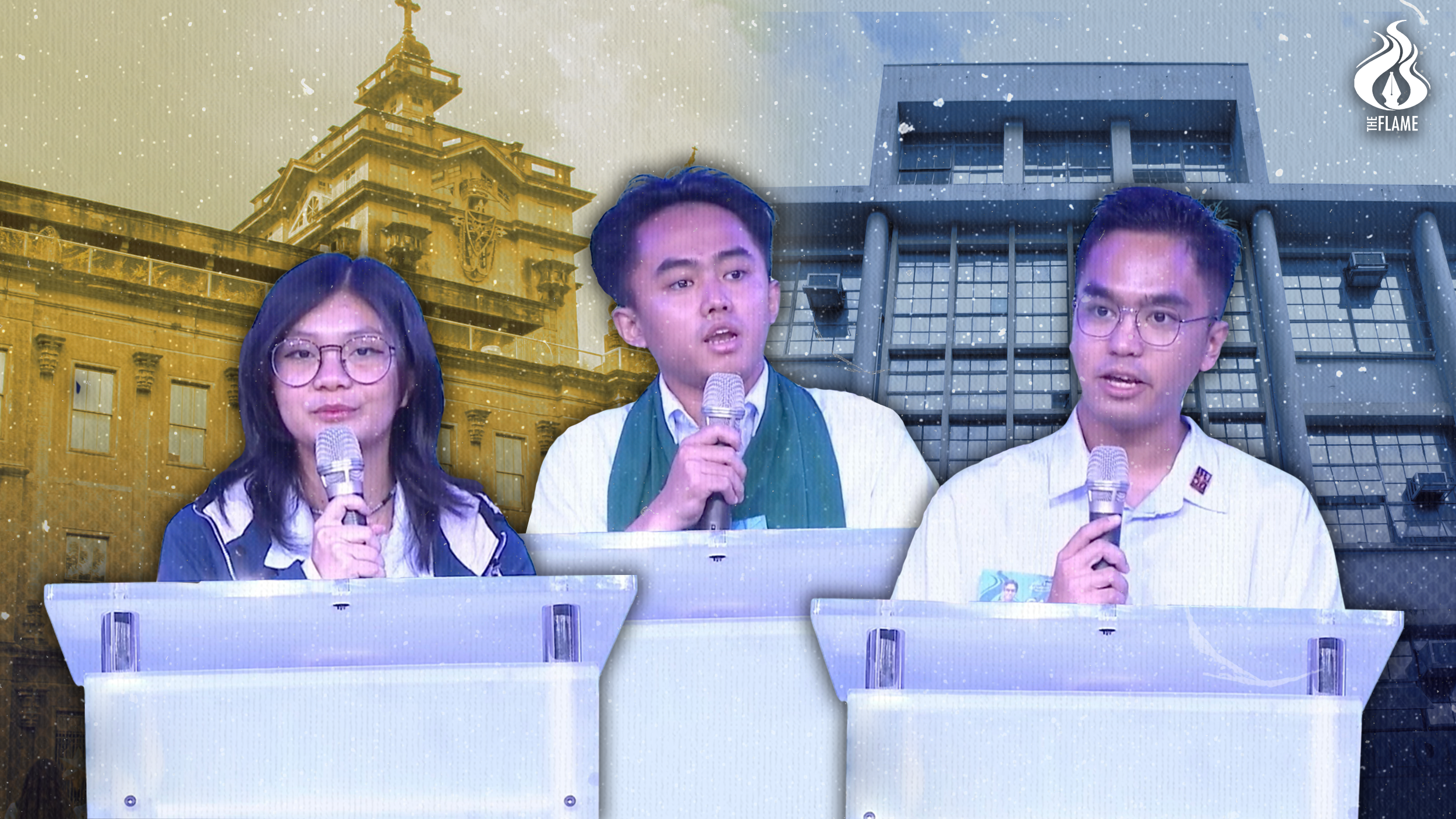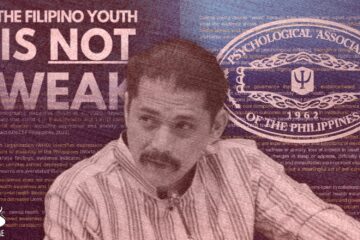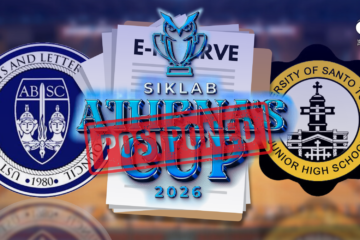
ALL CANDIDATES for Artlets Student Council (ABSC) president are seeking reforms to resolve what they believe to be UST’s “bureaucratic repressions” that supposedly tamper with the operations of recognized student councils and organizations.
In the ‘Face-to-Face’ segment of The Flame’s first-ever ABSC Elections Forum last Friday, April 19, all three aspiring ABSC presidents said they aim to tackle the administration’s “repressive” and “bureaucratic” systems through sustainable frameworks, systematic changes, and dialogues.
“We have to burn down this bureaucratic repression, this bureaucratic system that hinders us from organizing the different projects, initiatives we have not only in the [local student council] but also in other organizations,” independent candidate for president Gabriel Emmanuel Gabrillo said.
Tindig-AB candidate for president Justine Claire Ello also argued that such a system was behind the supposed “complacency” of some Thomasians in plans led by fellow students.
“We can see how this has made other students complacent about our projects as they’re expecting more from us student leaders and we cannot simply deliver it under this bureaucratic system,” she said.
The discussion was about a previous claim by the UST Central Student Council that the performance of their duties was compromised by the University’s “bureaucratic” requirements.
The Office of Student Affairs (OSA) previously held a dialogue with recognized student councils and organizations to discuss its student-related policies and guidelines following a series of backlash that stemmed from its order to take down one of TomasinoWeb’s photos.
According to the UST Student Handbook, all central and local student councils, including the ABSC, are under the advisory of OSA, the University’s governing body that looks into all student-initiated and student-related activities.
Asked if the candidates are in favor of the separation of student councils from OSA during the forum’s ‘Flex (for) or Flush (against)’ segment, only independent president bet Raymond Janfred Quinto disagreed.
The candidates also unanimously agreed that the University operates on a backward or medieval system.
Gabrillo claimed that he has experienced “heavy” bureaucracy in the hands of University officials during his tenure as secretary of the UST Asian Studies Society.
“I actually do believe that there exists such a system that hinders…not just the council itself, but almost all organizations, all [college-based organizations], interest organizations, even societies from performing their mandates, from performing their function, from organizing their projects,” he added.
According to him, student councils and college-based organizations are prevented from fulfilling their mandates due to extensive processes and inconsistent instructions imposed by the administration when filing for project approvals.
The Asian studies junior also claimed that some University officials have tendencies to impose red tape on some of the student councils’ advocacies. A “systematic change” would allow UST to be more connected to the sentiments of its students, he added.
Ello echoed the same sentiments, alleging that such a system also extends to student organizations.
“It is within this bureaucratic system that it has hindered the council’s events and the council’s advocacies on how they can deliver those events,” she said.
The creative writing sophomore said she had witnessed the “tiring” restrictions from administration officials during her time as ABSC vice president for internal affairs (IVP) last term.
“In a bureaucratic system, we can see how challenging it is to fulfill and carry out projects within the council. How much more for our societies, interest organizations, and university-wide organizations?” she said.
According to Ello, such a system can be addressed by communicating with the central and local student council as well as external communities to assert the students’ rights within and outside the University.
‘Limited power’
Despite acknowledging the existence of bureaucratic systems in the University, political science sophomore Quinto said student leaders must know the limitations of their authority as they must still adhere to university policies.
“If we are aware of our state as students, we should first understand the reality, where we are, and the extent of our power as students,” he said.
Quinto cited the need for a sustainable system with a legal and administrative framework based on international standards that would “counteract” the University’s “administrative” systems in processing papers and requirements.
“The management system must be innovated towards counteracting the existing [prohibitions] that hinder us students from performing our proactive stances,” the independent candidate said.
“If we can see that our organizations in AB are sustainable and smart, we can then advocate or propose to the administration that what we are doing is based on sustainable development standards not only recognized locally but also internationally.”
Gabrillo questioned Quinto’s approach and asked him if he considers himself pro-administration.
According to Quinto, such an approach does not reflect pro-administration measures but provides student leaders with opportunities to innovate their management systems despite limitations.
“I don’t think that is a pro-administration response. But, rather, it is a form of a call to action for the administration to see that the students are actually doing their best,” Quinto said.
The dialogue was raised when each candidate for president was asked if he or she believes a bureaucratic system exists within the University.
Ello added that despite some challenges faced by organizations and councils in UST, student leaders must still take accountability in carrying out their duties.
“As student leaders and as executive board members, we first have to hold accountability towards ourselves when it comes to the deliverance of our platforms and our projects and advocacies and how we deliver [those] projects and advocacies,” she said, referring to the outgoing CSC officers, some of whom recently criticized OSA’s “bureaucratic” requirements.
The Flame’s ABSC Elections Forum was attended by eight candidates who articulated their platforms and tackled pressing issues affecting the Artlets community. It was held at the UST Communication Bureau on the 12th floor of the Buenaventura Garcia Paredes, O.P. Building.
A total of eight candidates are vying for positions in the ABSC this year. The voting period will be held from April 22 to 27. F



